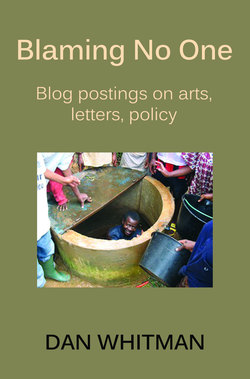Читать книгу Blaming No One - Dan Inc. Whitman - Страница 14
На сайте Литреса книга снята с продажи.
Mission Possible in Munich May 20, 2011
ОглавлениеPictured here is Elisabeth Ramzews with an “unaccompanied minor,” in Munich, Germany. To Elisabeth’s left is the Togolese girl’s mother, moments after the two were reunited in 2007, after Elisabeth got the child off the plane that was deporting her. The authorities who had ordered the deportation thanked Ramzews and her Evangelical mission for clearing the record and setting the case straight. Lots of disputes, but an outcome that pleased all.
In recent weeks, President Obama has moved immigration back to the front burner of U.S. policy, approaching yet another third rail in domestic U.S. politics and passions. There could be lessons to learn from the country which created social security in the nineteenth century under a reluctant but savvy Otto von Bismarck.
Germany has one of the highest proportions of properly documented refugees of any country, ranking at the top near Sweden. Not ignoring the country’s misdeeds in the twentieth century, Germany finds a way forward in this dilemma-mined issue. There may be a measure of expiation here, but good sense is also a large part of the equation.
Some stats here, from the UN High Commissioner on Refugees: 2005, the last year with published figures, Germany was the first ranking OECD country to take refugees, with 0.7 percent of their population in this category. The United States, by comparison, had 0.4 percent. France, Canada, UK, and the United States have high figures on immigration, but not on refugee intake.
In terms of demand, refugee seekers apply in greatest numbers to the United States, then to France, Germany, Sweden, Canada. In 2010, the numbers of applications to Germany swelled by 49 percent. These are the numbers of those wanting in, not those who got that status.
Not many nations love their government, and Germans are not enamored of theirs. Yet public-private partnerships get set up to take on the challenges of current demographic storms which Western countries will somehow have to face.
Few people favor large movements of refugees, sometimes least of all the refugees themselves. Wide ranges of motivations get them from areas of conflict to countries that are equipped to absorb them – from opportunism to family reunification to survival. Wealthy countries don’t seek immigrants, though in aging populations, the source of labor can be welcome.
Elizabeth Ramzews describes herself as a “Delta Force commando” in the complexities and always slipping nuances of theory and practice by the German state toward refugees. When she began to be involved in this field for the Evangelical Church (she herself is Catholic), many of the refugees making their way to her country came from conflict zones in Afghanistan and Iraq. Let that point stand on its own.
Here’s how it works in Germany: the State regulates intake, and standardizes the treatment of engagement for “minors separated from their families” (that would be, teenagers between the ages of sixteen and eighteen). But the actual work is conducted by Caritas, its Protestant equivalent Innere Mission, and other NGOs. The State isn’t set up to do the work, the NGOs are not set up to pay, so state resources and buildings are given over to the NGOs, with close oversight on how it’s working.
At an earlier time, children of the 16-18 range were given a Devil’s deal: “Ask for refugee status, and you are then no longer a minor under German law.” But this was rectified in 2005.
Ramzews says the relationship between the state and the churches and NGOs is tense, with frequent retracing of the rules of engagement. But the relationship exists. “It is a hard battle, but we are succeeding,” she says.
In 1997 the EU instituted the Dublin Agreement, which was meant to set standards for EU treatment of asylum seekers. As of 2001, an application for the EU could be handled by “one, and only one” EU country. The Dublin Agreement says that an applicant’s case must be taken up in the country in which the applicant entered – legally or illegally.
In practice, though, some of the points of intake simply do not have systems in place, notably Greece. Hence, word is out in conflict areas that if you want to get out of a war, find a boat going to some shore on the Mediterranean, but then somehow get yourself to Germany, preferably Bavaria. Conditions are not good for the newly arrived, but some NGO will get you a bed and some meals and language lessons, and keep you for ninety days until a real placement can be found. In the meantime, adjudication happens, and some refugees are deported depending on the particulars of their case.
As the U.S. still largely begs off on giving refugee status to individuals fleeing the Iraq and Afghanistan wars, Europe quietly takes up the slack. Many of those coming from Iraq are from ethnic and religious minorities such as Yesidi, Gnostics, Chaldeans, and Mandeans. The latter speak Aramaic, the language of Jesus and John the Baptist. Chaos in Iraq of course has unleashed old enmities, and the churches and residences of these ancient sects are being targeted increasingly by bombs and killings. So, flee they must.
The Innere Mission center in Munich uses a government-provided facility intended for 30, but now houses 120 – ten to a room. The tenants’ situations are not enviable, but they get basic necessities until the courts figure out their next move.
The Munich mission now has 1,800 workers spending time on various social programs dealing with refugees and other social challenges. The national umbrella organization is Diakonie.
It could be that a little less rage, and more pragmatism, might be an alternate approach to the demographic tsunamis we are now dealing with. As we have seen, tsunamis are indifferent to policy, they just happen.
